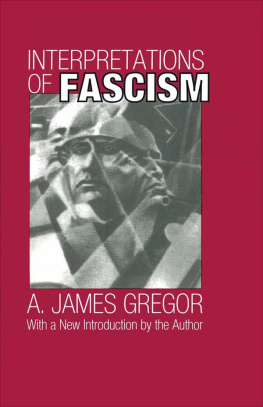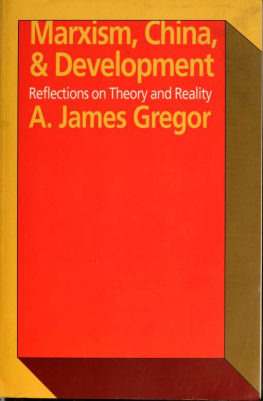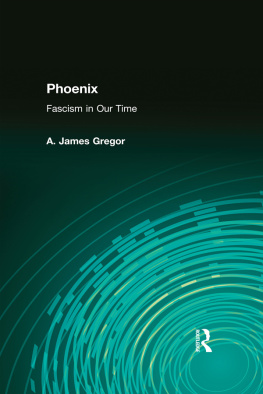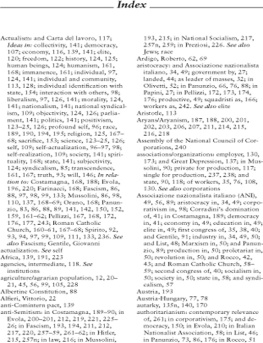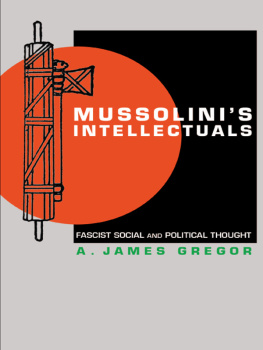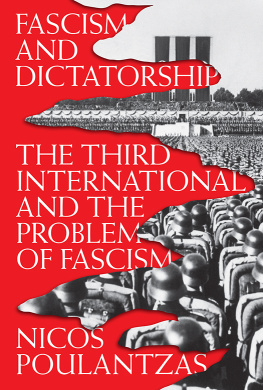Originally published in 1974 by General Learning Press
Published 1997 by Transaction Publishers
Published 2017 by Routledge
2 Park Square, Milton Park, Abingdon, Oxon 0X14 4RN
711 Third Avenue, New York, NY 10017, USA
Routledge is an imprint of the Taylor & Francis Group, an informa business
New material this edition copyright 1997 by Taylor & Francis.
All rights reserved. No part of this book may be reprinted or reproduced or utilised in any form or by any electronic, mechanical, or other means, now known or hereafter invented, including photocopying and recording, or in any information storage or retrieval system, without permission in writing from the publishers.
Notice:
Product or corporate names may be trademarks or registered trademarks, and are used only for identification and explanation without intent to infringe.
Library of Congress Catalog Number: 96-50964
Library of Congress Cataloging-in-Publication Data
Gregor, A. James (Anthony James), 1929
Interpretations of fascism / A. James Gregor ; with a new introduction by the author.
p. cm.
Includes bibliographical references and index.
ISBN 1-56000-950-0 (pbk.)
1. Fascism. 2. FascismItaly. I. Title.
JC481.G6924 1997
320.5330945dc21 96-50964
CIP
ISBN 13: 978-1-56000-950-4 (pbk)
Interpretations of Fascism has weathered well. After more than two decades, there is very little in the text that requires change. The account provides not only a credible assessment of the academic attempts to come to understand fascism as a generic phenomenon, but it suggests a great deal about social science methodology and its limitations.
I would like to use this occasion to publicly thank all those persons and all those institutions that have been of assistance, not only in preparing the original text and assessing its merits, but who have contributed to the preparation of the new introduction. Professors Zeev Stembell, Philip Siegelman, Paul Hollander, and Peter Sperlich have all contributed generously to my efforts. The University of California, Berkeley, extended me the privileges of sabbatical leave and the United States Marine Corps Research Center at Quantico, Virginia, provided the facilities necessary for my work. Brigadier General Robert Blackman, Jr., and Dr. Keith Fleming, together with all the Centers civilian and military personnel, extended the courtesies that made my enterprise there not only more productive, but pleasant as well. My wife, Professor Maria Hsia Chang, and Master Charles Elmo each contributed in their own inimitable fashion.
A. James Gregor
Academicians do not have a particularly good record in anticipating political outcomes or providing interpretations of complex political phenomena. About two decades ago, some of the worlds most notable scholars informed us that we could not expect communismMarxist-Leninist political systemsto simply go away. The United States would be compelled to deal with communism as an unending...reality. As compensation, and at almost precisely the same time, we were also told that we need no longer concern ourselves about fascism.
By the mid-1990s, however, Marxist-Leninist systems had either collapsed entirely or so transformed themselves that it is safe to say that we will never see their like again. In their place, we have seen the stirrings of what gives every appearance of being the reemergence of fascism. Several specialists, for example, have called our attention to what they see as the rise of fascism amid the political ruins of the former Soviet Union.
Not only was the collapse of the Soviet Union all but totally unanticipated by Sovietologists, That failure of scholarship has left everyone perplexed, and has regenerated interest in both trying to understand fascism and in delivering some account of the economic, social, psychological, and political circumstances that foster its appearance and provide for its success. After a relatively long period of indifference, academics, government officials, and the lay public are once again caught up in the fascination of a movement long considered to be of only antiquarian interest.
It seems evident that our time has not yet seen the last of fascism (however fascism is understood). That its reappearance has left us puzzled, as well as troubled, arises from the fact that we still do not seem to have any clear idea of what fascism is.
In 1975, at about the same time we were being told that fascism was extinct by others, Stanley Payne informed us that fascist is one of the vaguest of contemporary political terms.
It would seem to be particularly difficult to decide that some set of political phenomena is never to be seen again if one cannot identify the phenomena with any assurance. In the space of two decades, it appears we have made scant progress in defining, much less understanding, the object of our inquiry.
For the theoreticians of the European Parliament, fascism is hardly extinct. They seem to think that fascism is defined as anti-Jewish violence and racist vandalism.
These kinds of characterizations are not particularly helpful. However true they might be, such traits are certainly not exclusively fascist. Anti-Semitism, vandalism, brutality, the contempt for the individual, and the love of violence may have been common to fascism, but that information does very little to help us distinguish fascists from simple anti-Semites, vandals, brutes, and those contemptuous of individuals.
Some have offered criterial definitions
Again, none of this is really helpful. Now that we know that Josef Stalin was, himself, an anti-Semite, and many argue that he was an enemy of real socialism or communism, it is hard to maintain that, in and of themselves, criterial lists, like the one provided, have any great theoretical import.
Today, few deny that Soviet patriotism was all but indistinguishable from fanatical nationalism, or that the Soviet Union had embarked upon a massive state building program, or that, under Stalin, it endured the rule of a charismatic leader, or that the army served as a model to the nation. At best, criterial lists, without a supporting texta theoryprovide little more than pretheoretical mnemonic or heuristic aid. They really are little more than first efforts at typologizing.
Typologies or Taxonomies
Taxonomies work well in the standard sciences largely because they tend to be constructed and reconstructed on the basis of cues supplied by some reasonably well-formulated theory. The theory informs the taxonomist which traits are important.
While typologies are based on perceived similarities, the choice of similarities and differences upon which distinctions are based are functions of antecedently or collaterally held theoretical frameworks. Things are grouped together because they share traits. Which traits are chosen to define a class is a function of a theoretical perspective.
All things vary within limits, and it is a matter of judgment whether the degree of similarity justifies the grouping of things into specific classes or the measure of difference is important enough to require separate categories. Thus, we have constructed orders of descending classification ranging from kingdoms through genera and speciesbased on fundamental similarities, differences, and important variations. The distinctions are made on rational grounds, and in the case of zoological classification, traffic on reasonably well-articulated theory.


